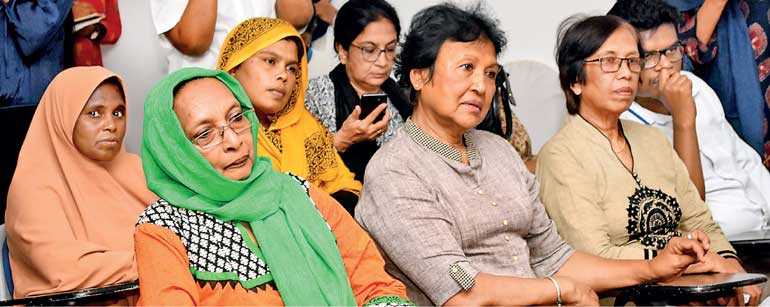Monday Feb 23, 2026
Monday Feb 23, 2026
Monday, 29 July 2019 00:00 - - {{hitsCtrl.values.hits}}


A group of Muslim women activists this week listed 10 demands to be urgently taken into account by the relevant authorities for the reforming of the controversial Muslim Marriage and Divorce Act (MMDA) and urged the need for fast-tracking the same.
Asserting the current Act is by and large ‘man made’ and not within the frame of the Islamic Shariah law, the activists stressed that delaying the reform process only adds to the ‘grave injustice’ caused to Muslim women in Sri Lanka.
“We are asking for amendments regarding the man-made laws affecting the women of Sri Lanka. It affects both men and women but the discrimination and difficulties are faced by the Muslim women,” said former Minister Ferial Ashraff while addressing journalists and activists at a press conference held in Colombo.
“We strongly believe that Shariah principles which promote justice and equality are in full compliance with human rights and the Constitution of Sri Lanka,” she added.
During the press event, which featured an all women panel comprising of representative from; Muslim Women’s Development Trust (MWDT), Puttalam, the Islamic Women’s Association for Research and Empowerment (IWARE), Batticaloa, Muslim Personal Law Reform Action Group (MPLRAG) and Women’s Action Network (WAN), North and East, it was urged for the 10-point demand list to be met at the earliest while ensuring that women be included throughout all stages of the reform exercise.
While the need for MMDA reforms have been advocated for over 40 years with no consensus reached as yet, the topic came under the fresh spotlight after Muslim MPs announced earlier this month they would bring about amendments to four specific areas of the Act.
While the need for MMDA reforms have been advocated for over 40 years with no consensus reached as yet, the topic came under the fresh spotlight after Muslim MPs announced earlier this month they would bring about amendments to four specific areas of the Act
The amendments unanimously agreed by the Muslim Parliamentarians were; Legal age for both the bride and groom be 18, the bride must sign the Register of Marriage as a sigh of consent, Quazis required to be Attorney-at-Law, and the allowing of females to be Quazis.
However, the move for amendments of the mentioned areas was met with resistance by the All Ceylon Jamiyyathul Ulama (ACJU) that released a statement pointing out that “it has been noticed there seems to be a hurried attempt to submit proposals of contradictory views for Cabinet approval”.
The statement further read that identified are “grave religious concerns” on the proposal.
To the repeated blocking of the reforms by different sections of the community, including the ACJU, the Muslim women activists expressed serious concern on certain groups attempting to hamper the process and calling on parliamentarians to make compromises in this regard.
“These groups have not demonstrated an understanding of the ground realities and have proven to be the forces against positive reforms in the past through the use of intimidation and violence.
“We express our deep regret that negotiations and consultations continue even after the agreement was reached by the parliamentarians – also that negotiations take place only with select, privileged, all-male groups, which means that the substantive reforms will be negatively affected. This is not a game. Reform is about lives and futures of Muslim women and children in particular, and the Muslim community as a whole,” the group said. The panel called upon the Ministry of Justice and the Government of Sri Lanka to take responsibility and push forward the reforms, and ensure it is not left only in the hands of Muslim ministers, particularly when it is clear that they are facing intimidation to alter agreed upon positions.
Pix Sameera Wijesinghe
